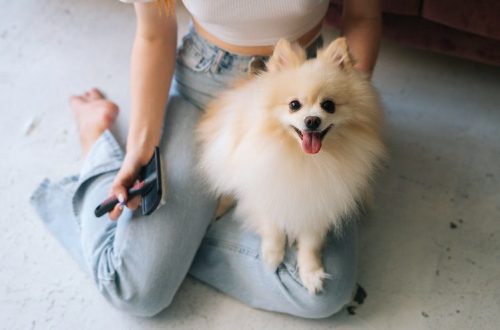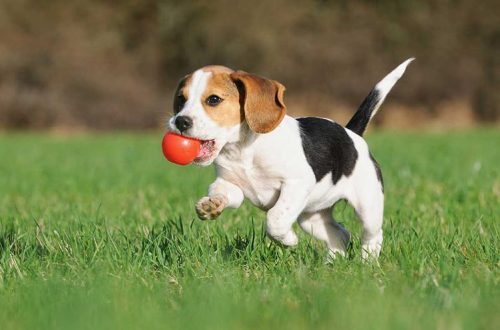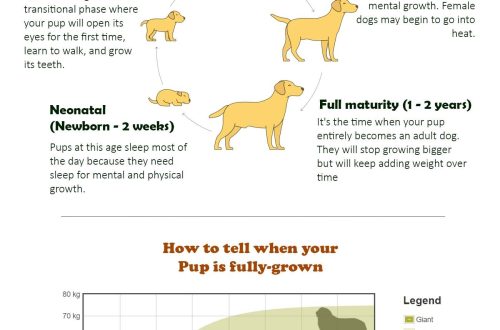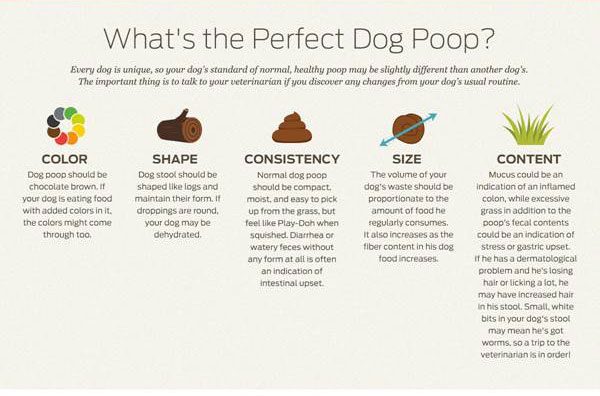
Diarrhea in a puppy: causes of loose stools and what to do
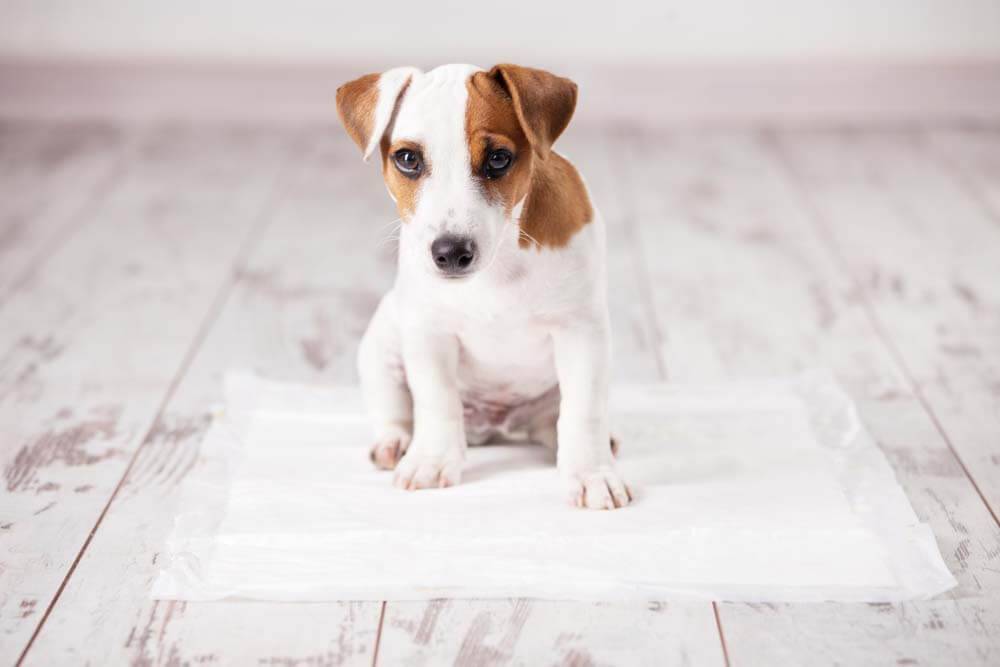
Contents
Puppy Diarrhea Essentials
- Diarrhea in puppies is quite common, often it goes away on its own, without treatment.
- Prolonged diarrhea or complicated by vomiting, refusal to eat, lethargy, bleeding is extremely dangerous for small puppies.
- Treatment will depend on the cause of the diarrhea.
- Timely treatments, vaccinations and proper feeding are the best ways to prevent diarrhea.
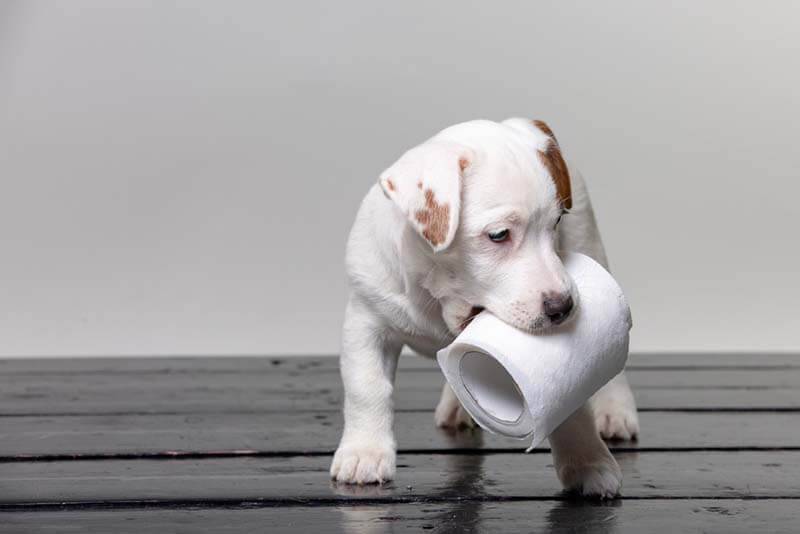
Possible causes by age
At any particular age, there are some of the most common reasons why a puppy will swear. This does not mean that at one age only one cause is possible, and at another only others. But the diagnosis always starts with the most probable, so let’s dwell on this in more detail.
Diarrhea in a 0-1 month old puppy
Developing diarrhea in a newborn puppy can be dangerous. It is at this age that he is most vulnerable. Puppies cannot yet move independently, they cannot see or hear, but they already have a well-developed sucking reflex. After birth, their first feeding with maternal colostrum begins. Colostrum contains the maximum amount of antibodies that can protect the puppy from viral infections. If the puppy is not allowed to suckle during the first few hours after birth, he will receive much fewer antibodies and will be extremely susceptible to infection. But, in addition to antibodies, substances that are unnecessary to the body can also be transmitted to the puppy with mother’s milk. For example, if a bitch receives some kind of medication, then this may be the cause of poisoning and diarrhea in her cub. In such a situation, it is necessary to transfer the puppy to artificial feeding. Another problem may lie here – feeding inappropriate milk. For artificial feeding of puppies, there are special ready-made mixtures that must be diluted with water. Only ready-made mixtures contain all the nutrients, vitamins and minerals necessary for proper growth and development. Often, small puppies begin to be fed cow’s or goat’s milk, adding yolk and vitamins there. Such nutrition is very likely to lead to poor digestion, diarrhea, vomiting, and stunted growth. The milk of different animal species differs significantly in its composition, and most importantly, in the content of fat, protein and sugar in it. Feeding the wrong type of milk is possible only as a last resort, when there is no way to purchase a mixture for dogs. In rare cases, puppies have individual allergic reactions to a mixture of some manufacturer, which is manifested by loose stools. But when switching to a mixture of another company, everything is usually resolved by itself.

After 1 month, the puppy begins a new stage of growth, and you can start introducing complementary foods, following some rules. This should be done smoothly, in small portions, not immediately excluding mother’s milk. It is better to start with special starter mousses, which are available from many pet food manufacturers. If you introduce complementary foods too abruptly (completely eliminate milk, give a large portion at once), this can cause diarrhea. Incorrectly selected food for age can also lead to diarrhea. Food for adult animals is not suitable as a first food because it has a completely different consistency and contains a different set of nutrients.
Before mating, the bitch must be treated for parasites. If this is not done, there is a high probability of infection of the puppies. The presence of helminths in the intestines will manifest itself in the form of diarrhea or vomiting. Many drugs, according to the instructions, are suitable for treating puppies from 3 weeks of age. If treatment is required earlier, this must be agreed with the neonatologist. He will help you choose the drug and dosage. It is not recommended to give medicines on your own and not according to the instructions.
Diarrhea in a puppy 2-3-4 months
From 2 months old, puppies can be partially or completely transferred to self-feeding. When feeding a puppy with industrial ready-made food, you should choose rations for dogs older than 2 months, but in no case should you give food for adult animals. If feeding is planned to continue with a home diet, then such nutrition should be discussed with a dietitian. Unbalanced feeding very often leads to problems with the gastrointestinal tract and, as a result, to diarrhea.
Starting at around 8 weeks old, puppies lose their colostral immunity and are at risk of contracting various infections. Parvovirus enteritis is one of the most common infectious diseases of the stomach and intestines of puppies of this age. This very dangerous disease with high lethality is manifested, first of all, by diarrhea, often simultaneously with vomiting. In the absence of an ambulance, a puppy can die in a matter of hours. Canine distemper can also cause diarrhea in puppies. This is an even more dangerous condition, since, in addition to the intestines, it also affects the respiratory organs, skin, and nervous system. In recent years, plague has been recorded very rarely, this is the merit of conscientious vaccination. Before carrying out a full vaccination and maintaining quarantine, in no case should the puppy be allowed to come into contact with the street and unfamiliar dogs. Wash your hands thoroughly before handling or feeding puppies. If the puppy has completed the full course of vaccination at 2 and 3 months, then there is very little chance of getting infected. The vaccine does not give a 100% guarantee of avoiding infection, but the disease in these dogs is much milder. If a puppy older than 2 months has sudden diarrhea and you don’t know what to do with his loose stools, contact your veterinarian.
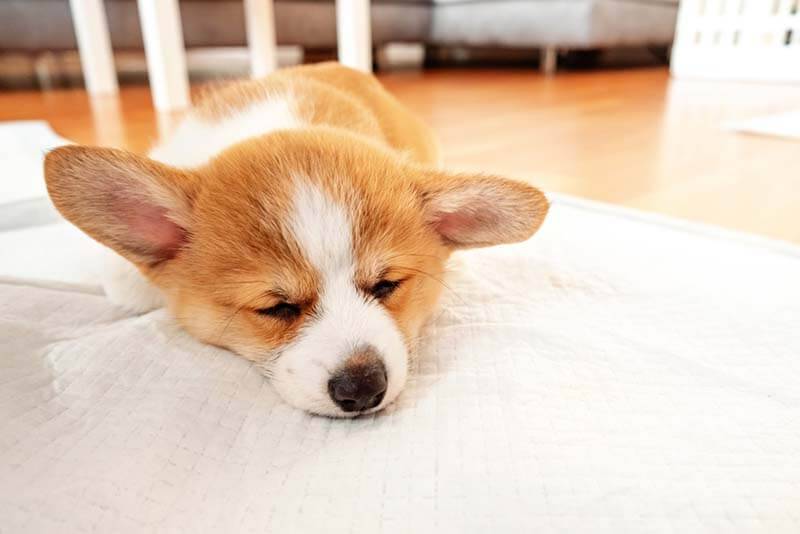
Diarrhea in a puppy 5 months and older
The causes of diarrhea in puppies older than 5 months are the same as those already mentioned. Often this is improper feeding with unbalanced food, various “snacks” from the table in the form of sausages, dryers and other things. If the puppy has not been vaccinated, the risk of infection still remains. At this age, the puppy is already very active and needs to walk outside a lot. And this carries the risk of eating inedible objects by the baby. Eaten sticks, bones, toys, bags can cause damage to the intestines and partial obstruction, which will be accompanied by diarrhea. Also, while picking up on the street, there is a high risk of ingestion of helminths. Puppies up to 6 months are recommended to be treated monthly, then – 1 time in 3 months.
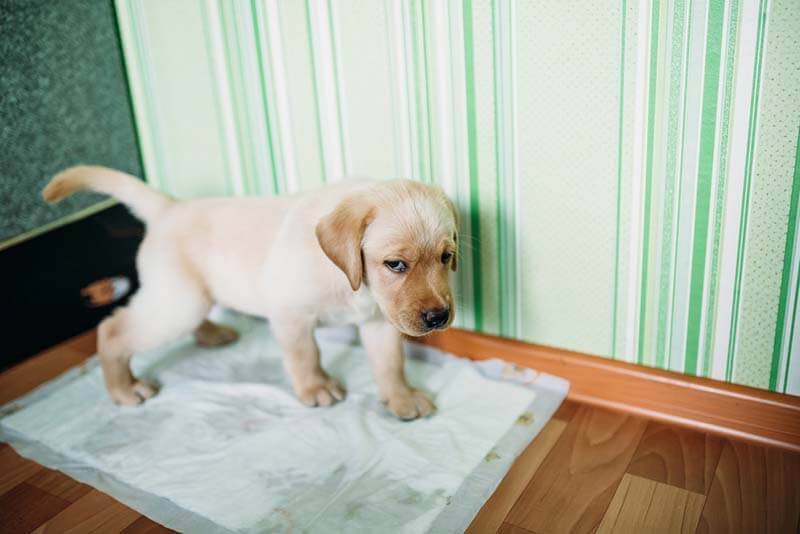
Possible manifestations of diarrhea
Loose stools may be uncomplicated. It may also be accompanied by vomiting or impurities of blood, mucus.
Uncomplicated diarrhea
This can be called a short diarrhea that resolved on its own. This is possible, for example, when eating something that is not suitable for a normal diet. For example, dogs do not refuse to eat sausage, cheese, sweets. But any violation of the diet can lead to a deterioration in the quality of the stool. If diarrhea is not accompanied by vomiting, refusal to eat and passes on its own in a day, then this condition is not considered critical and mandatory for visiting a doctor.
With slime
Often, along with loose stools in a puppy, you can notice the presence of mucous membranes in it. Sometimes diarrhea can be completely covered with mucus. Mucus is secreted by goblet cells, which are found predominantly in the large intestine. Its presence indicates that the process occurs in the large intestine or simultaneously in it and other areas. Most often, mucus in the puppy’s stool will be a sign of the presence of parasites. Puppies are prone to infestation because they are very curious and try everything on their teeth. Intestinal parasites include helminths and protozoa. Most often, you can find a round helminth toxocara or a flat one – dipylidia. In this case, infection with dipilidiosis most often occurs through fleas. They are carriers of eggs of this helminth, so flea treatments should not be neglected either. Of the protozoan parasites, giardia and coccidia are most common. Also, mucus in loose stools in puppies with diarrhea can be a sign of improper feeding, various viral and bacterial infections.
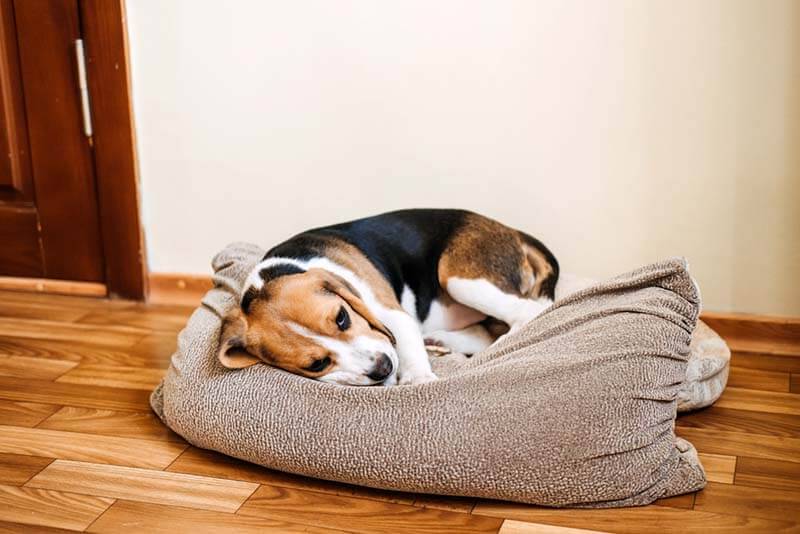
Diarrhea accompanied by vomiting
If diarrhea is accompanied by vomiting, this is a reason for immediate contact with the clinic. Since dehydration occurs very quickly, even before a final diagnosis is made, the puppy already needs first aid. Vomiting and diarrhea are often a sign of a viral illness. Parvovirus enteritis is an extremely dangerous disease that requires round-the-clock inpatient monitoring. Under no circumstances should this infection be treated on its own. The virus infects the cells of the intestine, leads to a deterioration in their performance and inflammation. In the smallest puppies, the virus can even infect the heart muscle. Often the main cause of puppy death is dehydration, so quality hydration is extremely important. There are no antiviral drugs that can defeat this virus. Another viral infection in puppies is canine distemper. In recent years, this disease has been recorded quite rarely, but the lethality of infection is still extremely high. The virus can infect intestinal cells, causing diarrhea and vomiting. It is also introduced into other organs – the skin, respiratory and nervous system.
Also, diarrhea can be accompanied by vomiting with food poisoning (poisoning), eating inedible objects, the presence of a large number of parasites in the intestines. Systemic diseases such as pancreatitis and liver disease are rare in puppies. Any case of diarrhea with vomiting should be considered at the doctor’s office. This condition requires investigation and urgent treatment.
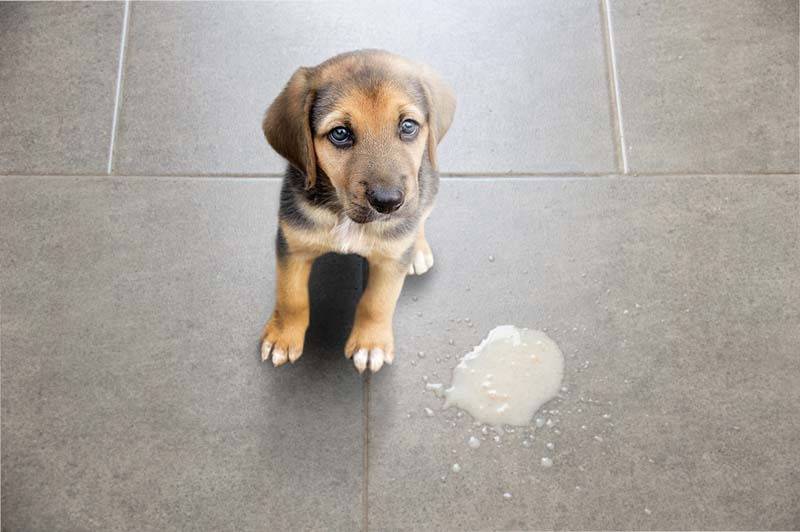
With blood
In some cases, diarrhea may be accompanied by blood in the stool. Most often, small streaks or blood clots appear after a fairly long duration of diarrhea. This is due to rupture of capillaries due to intestinal overstrain and constant tenesmus. If the blood in diarrhea is abundant or flows from the priests without ceasing, this may indicate serious intestinal bleeding or a violation of the blood coagulation function. Bleeding is possible, for example, when eating sharp bones, sticks, glass. Violation of the blood coagulation function often occurs due to poisoning with rodenticides – rat control agents. Usually they are placed in something tasty and attractive to rats, but a curious puppy may want to treat himself too. Anaplasmosis is an infectious disease transmitted by ticks. Anaplasmas invade and destroy platelets, causing the blood to not clot adequately, and intestinal bleeding can occur because of this. There is also such a genetic anomaly as von Willebrand disease. Dog breeds such as Doberman, Welsh Corgi, Bernese Mountain Dog, Coton de Tulear, Papillon, Poodle are more susceptible to this disease. The disease is manifested by a decrease in blood coagulation due to a genetic defect and, as a result, bleeding. All of these cases require emergency veterinary care and should never be observed at home.
After vaccination
In rare cases, diarrhea may occur as a side effect of vaccination due to a decrease in immunity. If the diarrhea is single and passed on its own, then you should not sound the alarm. But if a puppy has diarrhea in the first hours after vaccination, accompanied by vomiting, this is a reason to immediately return to the clinic. These symptoms may indicate an anaphylactic reaction and require urgent attention.
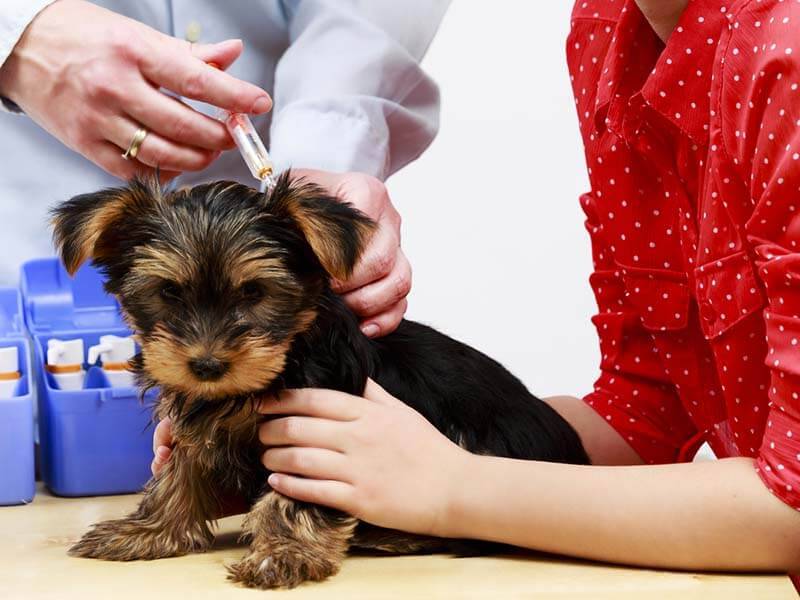
Melena
Melena is black, unformed, tar-like feces, often with a fetid odor. Melena is a symptom of bleeding in the stomach and upper intestines. At the exit, the blood turns black, as it has time to be digested by gastric juices and enzymes. Melena can be observed with injuries of the stomach-intestine due to eating sharp inedible objects. Melena is also the first sign of peptic ulcer disease. Ulcers in a puppy are most often associated with eating some chemicals (washing powder, vinegar).
Yellow diarrhea
For small, milk-fed puppies, soft light brown stools are normal. But if the stool is bright yellow, or the pet has been eating adult food for a long time, and before his stool looked normal, then this is worth paying attention to. The most favorable cause of yellow loose stools is eating some inappropriate foods (for example, the puppy drank a lot of cow’s milk). But more threatening diagnoses are also possible, such as diseases of the liver, gallbladder or pancreas. If such a stool is found, it is worthwhile to immediately undergo an examination.
Why can diarrhea be dangerous?
The main danger of diarrhea is that such feces remove a large amount of fluid from the body along with nutrients. Loss of fluid with feces leads to dehydration, thickening of the blood, deterioration in the performance of all organs and tissues. Normally, at least 60% of all fluid entering the body is absorbed in the small intestine, and with diarrhea, almost all of this fluid will come out with feces. With prolonged diarrhea, animals lose weight very quickly, become lethargic, and eat poorly. Body temperature can be both elevated and reduced. Puppies that refuse to eat, are in a state of vomiting or repeated watery stools, the presence of blood in it, altered body temperature – require an immediate visit to the doctor. Without treatment, this condition can become critical for the pet, and its death is possible.
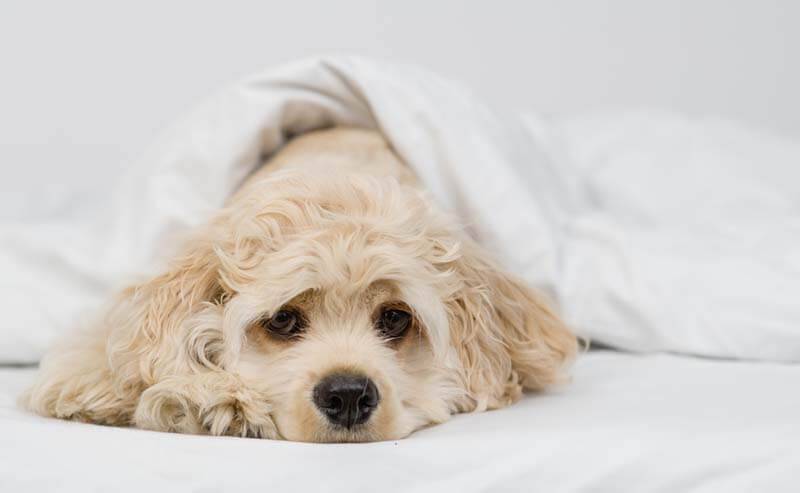
If an operative visit to the veterinarian is not possible
But what to do if the puppy has loose stools? Self-treatment of diarrhea is possible only in the absence of complicating factors and in the general satisfactory condition of the pet. At home, a puppy from diarrhea 1–2 hours before or after a meal can be given enterosorbents, which should help in mild cases. Improvement should occur no later than 1-2 days after the start of treatment. Otherwise, you should seek the possibility of contacting a veterinarian. In no case should you prescribe antibiotics, anti-inflammatory drugs to your pet, and also give him solutions from traditional medicine to drink. All these actions can only worsen the condition and complicate the work of the doctor.
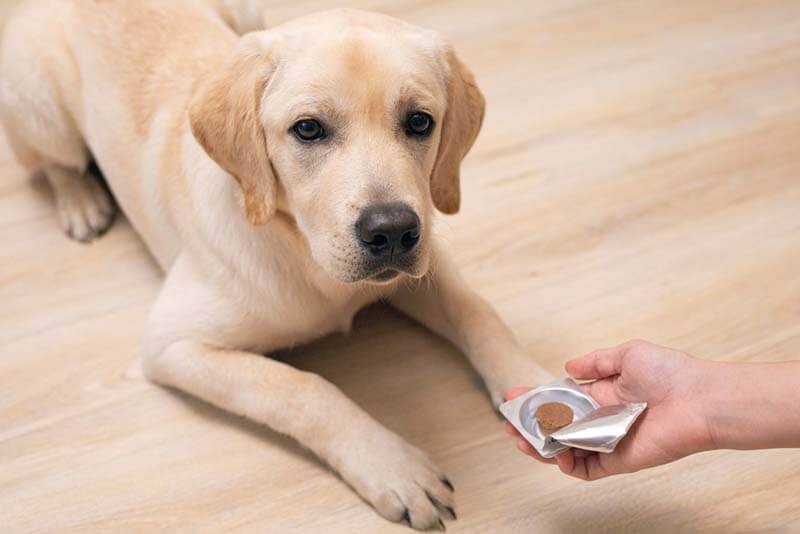
Diagnostics
Diagnosis of diarrhea is based, first of all, on the collection of a detailed history of the pet. It is necessary to tell the doctor in great detail about what the puppy eats now and what he ate before. What kind of treats he gets, when and with what drug were treated against parasites, whether he was vaccinated, whether he can pick up something from the floor or on the street, whether he chews on his toys. You should not hide the most uncomfortable moments from the doctor, for example, about how you didn’t keep track and the puppy ate his diaper. These data will greatly facilitate the correct diagnosis and, accordingly, the appointment of treatment.
Of the additional diagnostic methods, blood tests may be offered. A clinical blood test will show the presence of dehydration, if red blood counts are increased, their decrease will indicate anemia. An increased level of leukocytes will reveal an inflammatory process, a shift of the leukocyte formula to the left will indicate the severity of this inflammation, and increased lymphocytes will rather indicate the bacterial nature of the inflammation. A decrease in the level of leukocytes often indicates the viral nature of the disease, which is very characteristic of parvovirus enteritis. The level of albumin and potassium in the biochemical analysis will show whether there has been a serious loss due to diarrhea.
To confirm the infectious nature of the disease, PCR studies are used. If suspicion remains that the puppy has eaten a foreign object, tests such as abdominal ultrasound and X-rays are done. In doubtful cases, after feeding the puppy with a contrast agent, a series of x-rays may be taken to determine the location of the foreign object.
If a parasitic nature of diarrhea is suspected, different diagnostic tactics can be offered. The presence of parasites in the feces can be difficult to confirm laboratory. Helminth eggs do not come out with every act of defecation, and you can not guess on which day you need to collect the analysis. In this case, it is recommended to donate feces for several days in a row. To detect the simplest feces must be delivered to the laboratory as fresh and warm as possible, after half an hour all the parasites can die, and nothing will be found in the laboratory. In connection with these difficulties, a trial treatment for parasites according to the scheme may be offered by the doctor. The success of therapy will speak about the correct diagnosis.
Next, we will look at what is done when a puppy has diarrhea, and what treatment is needed in this case.
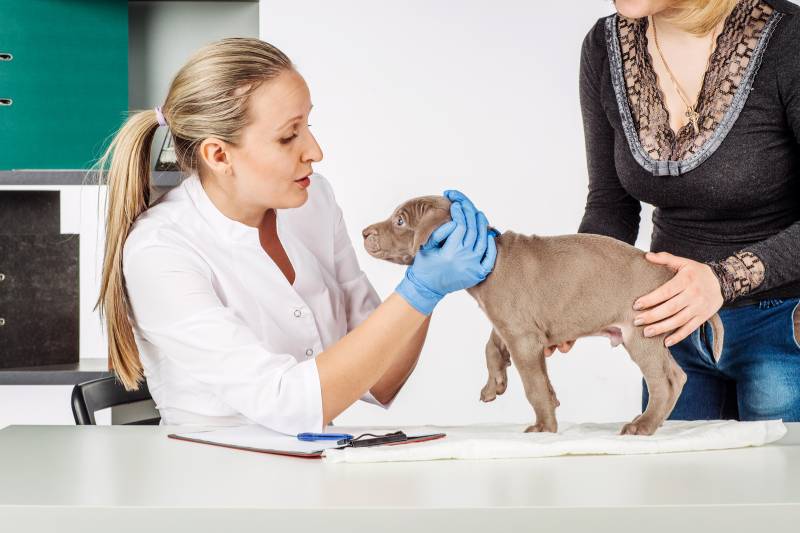
Treatment
Uncomplicated diarrhea often resolves on its own and does not require treatment. If the diarrhea has been going on for some time or other symptoms (blood in the stool, vomiting, lethargy, refusal to eat) have joined it, treatment will be required. Even before diagnosis, small puppies are given subcutaneous or intravenous maintenance volumes of crystalloid solutions. Symptomatically, you can start using enterosorbents, they will bind all the toxins in the intestines. When intestinal parasitosis is confirmed, antiparasitic treatments are prescribed. It is believed that in dogs, helminth preparations in the form of drops on the withers do not work well, therefore it is recommended that treatments be carried out in the form of tablets.
If a foreign object is found in the intestine, in most cases, surgery will be required. Infections are treated comprehensively, antimicrobial agents, painkillers, and gastroprotectors are used. Of the antimicrobial agents, penicillins, macrolides, metronidazole are used. Painkillers are usually administered in hospitals as infusions at a constant rate, so that the analgesic effect can be provided exactly at the right time. Gastroprotectors protect the gastric mucosa, normalize the pH of gastric juice. The attending physician will tell you what to feed a puppy with diarrhea. Often, with diseases of the stomach and intestines, a therapeutic diet is prescribed. Specialized feeds are easily digestible, and also help to restore the intestinal mucosa. If diarrhea was caused by nutritional errors, a therapeutic diet is prescribed to normalize the stool, which is usually sufficient in this situation.
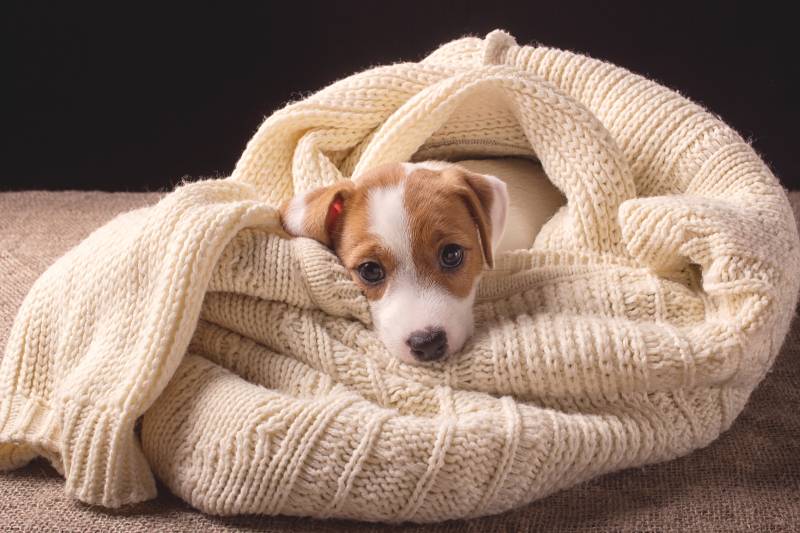
Prevention of diarrhea
The main measure of prevention should include proper balanced feeding. Different types of food are required for feeding puppies of different ages: mother’s milk or mixtures – substitutes for mother’s milk, starter mousses, puppy food. For proper feeding with a natural diet, consultation with a nutritionist is required. Preventive vaccination is carried out at the age of 8 weeks, then – at 12 weeks. Up to 6 months of age, it is recommended to treat puppies from helminths monthly, then – at least 1 time in 3 months. It is necessary to forbid the puppy to chew on his toys, pick up everything from the floor and from the ground on the street.
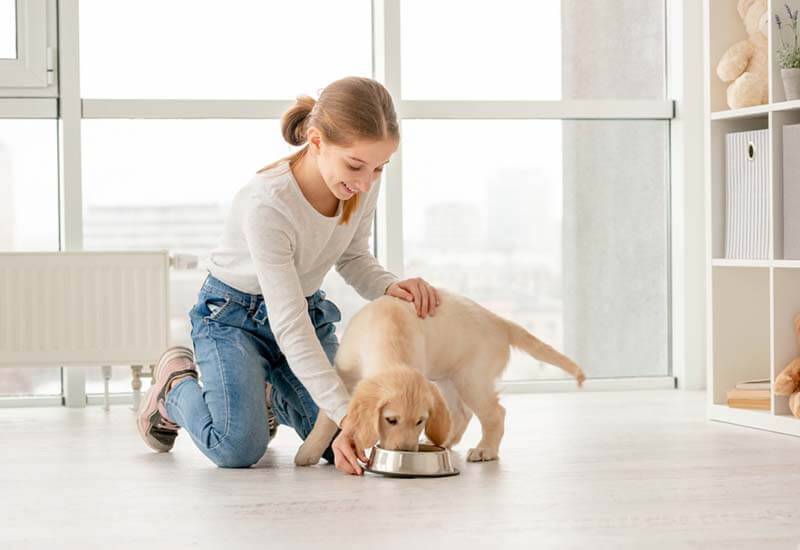
Answers to frequently asked questions
October 29 2021
Updated: November 7, 2021



